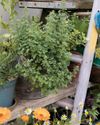
Everyone has their own colour sensibility, their own preferences, their own taste. Who knows whether or not our common colour language actually equates to the same colours perceived. Let's hope it does. We use a common language to talk about it and share an enthusiasm for using it, though every one of us has our own colour sense and our own way of applying it in our gardens.
Colour plays a vital role in all our gardens, whether it is cunningly conceived or accidentally achieved, the first impression that we receive, be it in our own gardens or anyone else's, is of colour. As our intellect gets to work and takes over, other aspects take on greater significance.
Our brains may register form, pattern and stature, but perhaps colour has the greatest effect. So how do you use colour in different locations to manipulate the space or respond to the specific conditions? Can colour make a small garden look bigger? What colours work best in a shady spot? Certainly food for thought.
"You need to deal with succession. It is an exciting adventure to think about how plants will follow one another"
FOR A LARGE PLOT
Using colour in a big garden is a luxury few of us have, but one that needs to be embraced on a grand scale- no point thinking small here. Here, large blocks of colour can be used, which means lots of plants are needed. Unless you're a millionaire, propagating your own plants is the best solution. Those millionaires don't know what they're missing! Choosing plants that clump up quickly is a winning policy and using a range of plants with diverse habits, heights and deportments helps, too.
Gertrude Jekyll planned some of her borders as a spectrum travelling through the rainbow, though blue and indigo never met; they were at either end of the border. This is just one idea.
Diese Geschichte stammt aus der December 2021-Ausgabe von Gardeners World.
Starten Sie Ihre 7-tägige kostenlose Testversion von Magzter GOLD, um auf Tausende kuratierte Premium-Storys sowie über 8.000 Zeitschriften und Zeitungen zuzugreifen.
Bereits Abonnent ? Anmelden
Diese Geschichte stammt aus der December 2021-Ausgabe von Gardeners World.
Starten Sie Ihre 7-tägige kostenlose Testversion von Magzter GOLD, um auf Tausende kuratierte Premium-Storys sowie über 8.000 Zeitschriften und Zeitungen zuzugreifen.
Bereits Abonnent? Anmelden

A new plot for tasty crops
Taking on a new allotment needn't be hard work. By simply following a few easy tips you can have bumper crops in no time, just like Alessandro Vitale

We love July
July is an island floating between the joy of June and the slightly fatigued month of August. It's a grown-up month: the year has shrugged off its adolescent exuberances, the weather is (hopefully) warm enough for ice cream to be one of your five a day, the sea should be swimmable without (too much) danger of hypothermia and thoughts will be of holiday shenanigans and family barbecues. School's out this month, the next tranche of glorious summer colour is washing across our borders and it's my birthday. Lots of reasons to give three rousing cheers for July!

YOUR PRUNING MONTH
Now, at the height of summer, Frances Tophill shows how to boost your plants' health and productivity with a timely cut

Hassle-free harvests
Flowers are out in abundance this month and for Jack Wallington, many of these blooms make delicious, low-effort pickings

Bite-sized bounties
Glorious doorstep harvests can easily turn into gluts, so let Rukmini Iyer's recipes help you savour every last bit

Upcycled outdoor living
Create unique and stylish garden features for minimal cost using reclaimed materials and simple DIY skills. Helen Riches shares four step-by-step projects and more inspiring eco tips

Secrets of a COLOURFUL GARDEN
Buildings and landscapes can play a vital role in supercharging your space, as Nick Bailey demonstrates

Greening up a city balcony
Looking for sustainable, small-space gardening ideas? Take inspiration from Oliver Hymans' transformed balcony garden in north-east London - now a lush, green haven for humans and wildlife

The dry and mighty garden
As we adapt our gardens to a more volatile climate, Alan Titchmarsh reveals how to create a drought-tolerant plot and picks his top plant performers

Nature knows best
Carol Klein explains how to choose plants for specific growing conditions, based on what has naturally adapted to thrive there